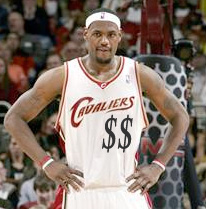About one year ago, one of the top stories in Major League Baseball involved the Los Angeles Dodgers offering Manny Rameriz $25 million for one year. To play baseball.
That wasn’t the story.
He (and blood sucking agent Soctt Boras) rejected this offer citing that he was worth more (over a longer period). This was during a time when the global economy was on the verge of imploding. Taxpayer money was being used as a crutch to stabilize crumbling financial institutions, the companies that didn’t collapse were laying off workers in droves, even Santa Claus had his hours cut during the last two Christmi (plural of Christmas).
And this, the same Manny Rameriz, who doesn’t run out ground balls, who shoves the 60 year old traveling secretary to the ground, who’s known to fake injuries to get out of games he doesn’t want to play, demands more than $25 million for one year. To play baseball.
Instances of an athlete’s greed is not isolated to Manny Rameriz. Every year, in each of the major sports (and occasionally hockey), we hear of the year’s biggest free agents rejecting colossal sums of money from their current team to squeeze out a few million more on the open market. To put things into perspective, the difference of what the superstar athlete is holding out for is usually just a few percent extra, yet the difference is still more than most Americans make in their entire lives. That’s reason enough for Joe 6-pack to fill with rage and curse the likes of “Manny being Manny“. Then you throw in the unemployment rate escalating over 10% (with the real unemployment rate being closer to 17%), and there breeds the real threat of a pitchfork to the neck courtesy of the blue collar mob.
Certainly the criticisms cast at these greed stricken athletes are fair, right? (Do you really think I would’ve built it up this way for the sake of agreement?)
No. It’s fair that someone who works 65 hour weeks and makes just enough money for the occasional night out at Applebees, feels some sort of animosity toward any individual who thinks that several million dollars isn’t enough money. The point I’d like to make is that these superstar athletes shouldn’t (and probably don’t) care what the common man thinks of their situation.
You’re probably thinking, “that’s pretty cold.” That’s true. But the same quality that makes an athlete hold out for the best possible contract also explains how they’ve gotten to where they are. It’s an unrivaled sense of competitiveness. It’s an incessant urge to be better than the person next to them. It’s a determination to do more than the status quo (I’ll stop for the sake of sounding like a high school coach).
In other words, they got to where they are by not paying too much attention to what “the common man” was doing. The common man went to basketball practice in high school, played a few extra pickup games on the weekend, worked out when their coach instructed them, and then proceeded onto their common life. The budding megastar athlete did all of this, and then dedicated the remaining free time to further fine tuning their craft. Whether their motives were to be the best, better than a particular rival, or to eventually become ultra-wealthy, their underlying sense of competitiveness is what has placed them atop of a very crowded hierarchy.
Similarly, our sense of bewilderment of “why are they holding out for the extra $2 million when they’ve already got more money then they could ever spend” should serve as our reminder as to why we’re not in their position. I’m guessing for many of these athletes, it’s not about the money (as clichè as that sounds). The money symbolizes a more qualitative sense of value. The money represents their standing within their sport. Athletes struggle for the extra 2 million dollars on a $150 million contract so they can look at the person next to them and say, “I’m $X million better than you”. What we interpret as greed is the same quality which makes watching the sport enjoyable in the first place: competition amongst the world’s most elite. I think the alternative to this would be reasonably paid athletes and mediocre talent (basically what sports were 40 years ago). I like our current situation better.
The next time you hear someone complain about so-and-so holding out for more money, take it for what it is: a lack of competitive awareness. Instead of joining in on their attack, take it as your reminder to find your domain of competition. And when you find it, don’t feel bad about being the best. Manny doesn’t.

